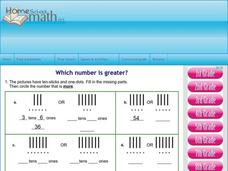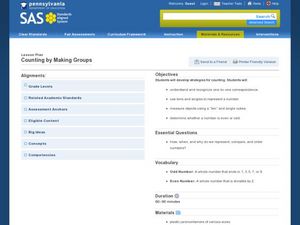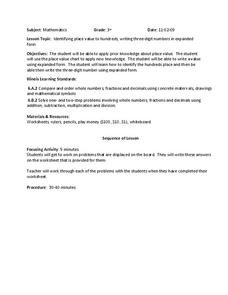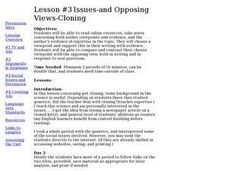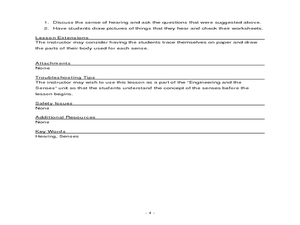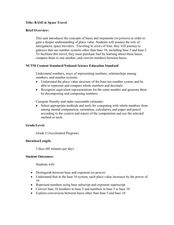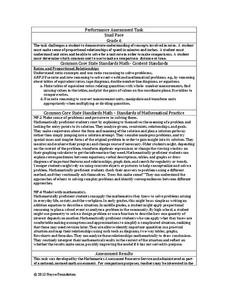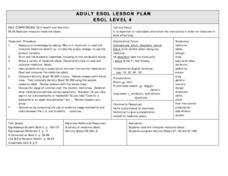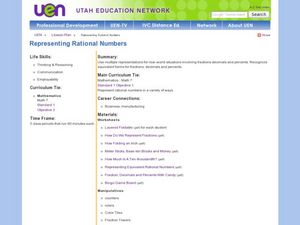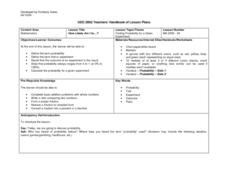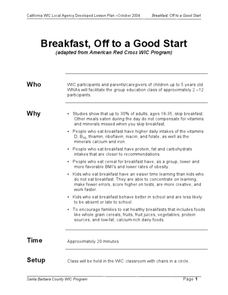Curated OER
Which Number is Greater?
Young scholars draw pictures of two digit numbers to identify the greater value. In this math lesson plan, students plot two digit numbers on a number line and identify the greatest or lesser value. Young scholars use the greater than...
Pennsylvania Department of Education
Seeing Doubles
Students work with dominoes to recognize the number of spots on each side as they relate to addition facts. In this seeing doubles lesson, students make triangle shaped flash cards for the double facts. Students represent the correct...
Curated OER
Fraction Conversion 2 (With Percents)
Fifth graders determine how to convert fractions, decimals, and percents. In this conversion lesson, 5th graders use an on-line applet to practice making these conversions. They review how to make the conversions in a whole class lesson...
Curated OER
Food Chains
Students study food chains by creating their own slide show using KidPix. They compare information after sharing their slide shows as a whole group. As the children are watching the slide shows of their peers, they tally every time...
Curated OER
Length Lotto-Teacher's Notes
Students convert metric units of length, specifically meters, centimeters, and millimeters. In this activity of converting measurements, students participate in various games which require them to put the measurements in order or...
Curated OER
Baseball Statistics
Students take an in depth examine baseball record breakers. They calculate statistics, not just for one year, but over whole careers, to compare some famous players and find who was the best all-time home run hitter.
Curated OER
Time: Attribute
Learners participate in five teacher-led, whole class activities that explore sequences of time and the concept of faster and slower. They sequence school day events, create a book of their daily schedule, put the days of the week in...
Curated OER
Comparing Ratios
For this comparing ratios worksheet, students solve and complete 3 different problems using the screens shown. First, they write a ratio that compares the shaded part to unshaded part illustrated. Then, students use the same grid to...
Curated OER
Counting by Making Groups
First graders represent, compare, and order numbers. In this counting skills lesson, 1st graders use manipulatives to demonstrate one-to-one correspondence and to represent numbers. This lesson includes a teacher script to guide the lesson.
Curated OER
Identifying Place Value
Third graders complete math problems. In this place value lesson, 3rd graders solve problems that require them to write the place value of a number in expanded form and identify the place value and expanded form of three digit...
Curated OER
Temperate Forests vs. Wetlands
Learners compare and contrast the temperate forest and wetlands by researching them in groups. In this forest lesson plan, students identify the economic, ecological, and social benefits of each.
Curated OER
Engineering and the Senses: Smell
Students define the sense of smell. In this smell sense lesson, students review their five senses and define the importance of smell. Students practice smelling and identifying items in bags. Students discuss the importance of smell to...
Curated OER
Issues and Opposing Views: Cloning
Students complete analysis activities to compare and contrast an opposing view point in writing and orally. In this opposing views lesson, students complete research about cloning. Students make presentations for their view points on the...
Curated OER
Engineering and the Senses: Hearing
Students explore the sense of hearing. In this 5 senses activity, students consider how humans and animals use the sense of hearing along with their other senses. Students discuss the body parts responsible for the 5 senses and...
Curated OER
BASE-ic Space Travel
In this 3-day place-value lesson, upper-elementary kids investigate the base 5 and base 2 systems as an introduction to exponents and powers. They create a pocket chart to help ground their understanding of bases, exponents, and powers,...
Noyce Foundation
Snail Pace
Slow and steady wins the race? In the assessment task, scholars calculate the rates at which different snails travel in order to find the fastest snail. Hopefully, your class will move much more quickly in finishing the task!
Pennsylvania Department of Education
Comparing Sets
Students count back with cubes to model subtraction problems. For this subtraction lesson plan, students compare sets of problems and record their results in a table.
Curated OER
Introduction to Decimals
In this math worksheet, students are introduced to decimals by first studying pattern blocks showing a number with tens, ones and tenths. Students locate decimals on number lines and rulers and shade decimal pictures. Students compare...
Curated OER
Introduction to Fractions on the Numberline
Students use color-cued fraction strips and a color-cued numberline to develop basic fraction concepts and correct sequencing. They complete a worksheet using equivalent fractions to solve the problems.
Curated OER
Which Medicine To Take?
Students demonstrate the appropriate way to read a medicine label. They read and interpret dosing instructions for both prescription and over the counter medications. Students discuss the usage of over the counter medications based on...
Curated OER
Thinking Syntactically: Using non-print text to faciliate generation of syntax and analysis of tone
Learners write with a command of the stylistic aspects of composition. They respond to non-print text. Students demonstrate working knowledge of syntactical choices. They construct sentences using descriptive language. Learners analyze...
Curated OER
Representing Rational Numbers
Seventh graders explore rational numbers. In this fractions, decimals, and percents lesson, 7th graders identify and compare equivalencies between fractions, decimals, and percents. Students use hands-on activities to investigate the...
Curated OER
Probability: How Likely Am I to...?
Twelfth graders examine various ways probability is applied to daily situations. They use marbles and blocks to calculate the probabilities of picking certain colors. They also calculate the odds of picking a winning raffle ticket.
Curated OER
Breakfast, Off to a Good Start
Students discover the benefits of eating a healthy breakfast. In this adult health activity, students compare the characteristics of breakfast eaters and nonbreakfast eaters. They examine cereals for their fiber and sugar content.


